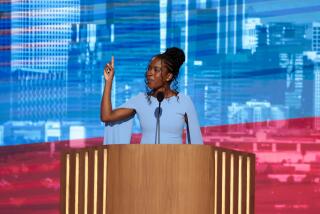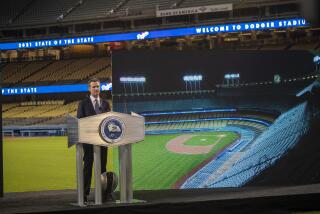Bush’s Rhetoric Loses Zip of a ‘Kinder, Gentler’ Muse
WASHINGTON — President Bush’s State of the Union speech writers had a hard act to follow for tonight’s address: matching nuggets once provided by wordsmith Peggy Noonan, who coined “a thousand points of light” and borrowed “read my lips” but who now suggests her job was neither kind nor gentle.
Noonan has been out of favor at the White House since she left last year to write a book about her days as a speech writer for both Bush and former President Ronald Reagan.
White House aides concede Bush hasn’t sounded quite so striking since Noonan stopped putting words in his mouth.
“The underpinnings of the United States, the state of the union, is not bad,” Bush told a group of newspaper publishers last week when asked to preview his Wednesday night address.
“Not bad,” but it doesn’t have much ring.
In Bush’s 1989 inaugural address, he spoke of a “new breeze” blowing through the world. He promised Democratic leaders an “age of the offered hand.”
Vintage Noonan--and the last speech she wrote for him.
Bush’s characterization of a “kinder, gentler nation,” contained in his acceptance speech to the Republican National Convention, has become one of the President’s signature phrases. But, Noonan writes in a book published last week, it was just a “kinder nation” in her first draft. She later scribbled in “gentler.”
She also takes credit for “read my lips,” even though Bush aides tried to take it out because “there is no history of presidential candidates making personal-organ references in acceptance speeches.”
Bush left the phrase--actually a borrowing from a Clint Eastwood movie--in.
Noonan also claims credit for Bush’s “thousand points of light,” but allows it might have been influenced by a line from a favorite author, Thomas Wolfe, who wrote in “The Web and the Rock” of a “thousand points of friendly light.”
Noonan, who also wrote Reagan’s farewell television speech to the nation, said she had trouble drawing out the “Great Communicator” in five drafting sessions she had with him in the last two months of his term.
When she asked him what his most difficult day was, Reagan responded: “Oh well, I don’t know.”
She then asked Reagan if he sometimes felt like the “boy in the bubble?”
“Who was that?” Noonan said he asked.
“The boy who had no immune system, so he had to live in a plastic bubble where he could see everyone and they could see him but . . . he couldn’t touch them,” she tells him.
Reagan’s reply: “Well, no.”
More to Read
Get the L.A. Times Politics newsletter
Deeply reported insights into legislation, politics and policy from Sacramento, Washington and beyond. In your inbox three times per week.
You may occasionally receive promotional content from the Los Angeles Times.










